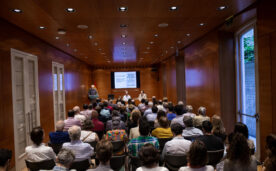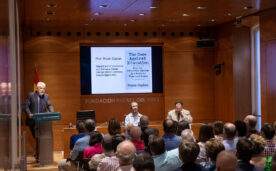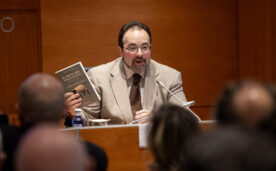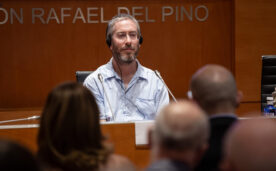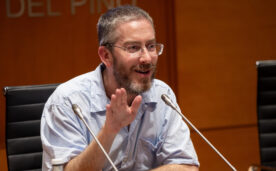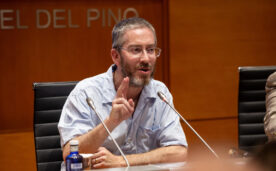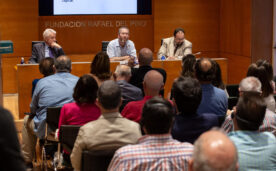Open Borders. Why the education system can be a waste of time and money.
Summary:
On 25 June 2019, Bryan Caplan, Professor of Economics at George Mason University and columnist for EconLog, gave a lecture at the Rafael del Pino Foundation entitled "Open Borders. Why the education system can be a waste of time and money", in which he spoke about education and immigration. Caplan began by saying that everyone always has the idea that we need better education. However, no politician says that we are wasting the money we spend on it, and this is very strange. In fact, when it comes to education, economists and politicians always agree, because economists measure the financial benefits to the individual and realise that education brings an economic return in the form of higher wages. But when we look at education, we tend not to realise that, more often than not, we are not taught a skill that is useful beyond passing an exam. Employers still value people by how well they do in school through grades, whether it's maths, literature or history. Without those grades, you can't go to university or get a good job. Also, if you study Latin, you have a clear future because the big universities open their doors to you. The signalling model of education says that some subjects are useful, like mathematics, but there are other subjects, like music, that are irrelevant. However, they are worth studying because they convince the employer that you are smart, hard-working and conscientious. The school, in short, puts a stamp on your forehead and the more stamps you have, the more the employer will value you. The market rewards students for doing well, even if the subjects are completely irrelevant. In the United States, students spend 70% of their time on subjects that will serve no purpose in the future. Moreover, the level of knowledge of students is very low. Many of them, for example, do not know who Roosevelt was. In education, useless things are worthwhile, while useful things are not. This can be seen in the following example. If you want to go to Harvard and get a degree, you have to pay 70,000 dollars a year. But you can also go and live in Cambridge and attend Harvard classes without enrolling because nobody there will ask you for an ID card, passport or any other identification document. You can even go up to a professor, tell him or her that you really like their subject and that you would like to be able to attend their classes, to which he or she will surely reply that he or she would be delighted and allow you to attend. After four years you would have acquired the knowledge and saved $280,000, but you would not have a degree and you would not be able to use it to get a job. If you want to acquire qualifications that are going to be useful to you, you would have to find teachers who are strict. But what students in the United States want are teachers with 'maria' subjects. That, however, is cheating yourself and demeaning your degree. But we are in a world of university degrees in order to get a job. This is called degree inflation. The result is that now, in many places, you need a university degree to be a waiter. What can you do about it? Be frugal, spend less money, and then there will be fewer people with a degree, so employers will have no choice but to consider people without a degree in their recruitment processes. More emphasis should also be placed on vocational training, as in Germany or Switzerland. Another issue is migration: why do people who like free markets not like migration? Restrictions on the free movement of people are a massive government restriction on human freedom. If a government won't let you, you can't live in a place. There are many people who want to work in the first world who can't because the laws don't allow them to. But the greater the wage differential between Miami and Puerto Rico, the more Puerto Ricans will want to go to work in Miami, thus generating more wealth for the country that receives them. Many liberals defend the anti-immigration policy on the grounds that these people are entering the country illegally. They also say that Muslim immigrants are going to do things and want them to stay out. A terrorist attack, however, depends more on who stays out than who comes in. They also say that, if there is a welfare state, there have to be restrictions to make it viable, that immigrants will vote for sharia, etc. Miltron Friedman, however, defended immigration because the fiscal balance it implies is positive, since the income that immigrants contribute to the public budget, directly and indirectly through their activities, is greater than the expenses they generate.
The Rafael del Pino Foundation is not responsible for the comments, opinions or statements made by the people who participate in its activities and which are expressed as a result of their inalienable right to freedom of expression and under their sole responsibility. The contents included in the summary of this conference are the result of the debates held at the meeting held for this purpose at the Foundation and are the responsibility of their authors.
The Rafael del Pino Foundation is not responsible for any comments, opinions or statements made by third parties. In this respect, the FRP is not obliged to monitor the views expressed by such third parties who participate in its activities and which are expressed as a result of their inalienable right to freedom of expression and under their own responsibility. The contents included in the summary of this conference are the result of the discussions that took place during the conference organised for this purpose at the Foundation and are the sole responsibility of its authors.
